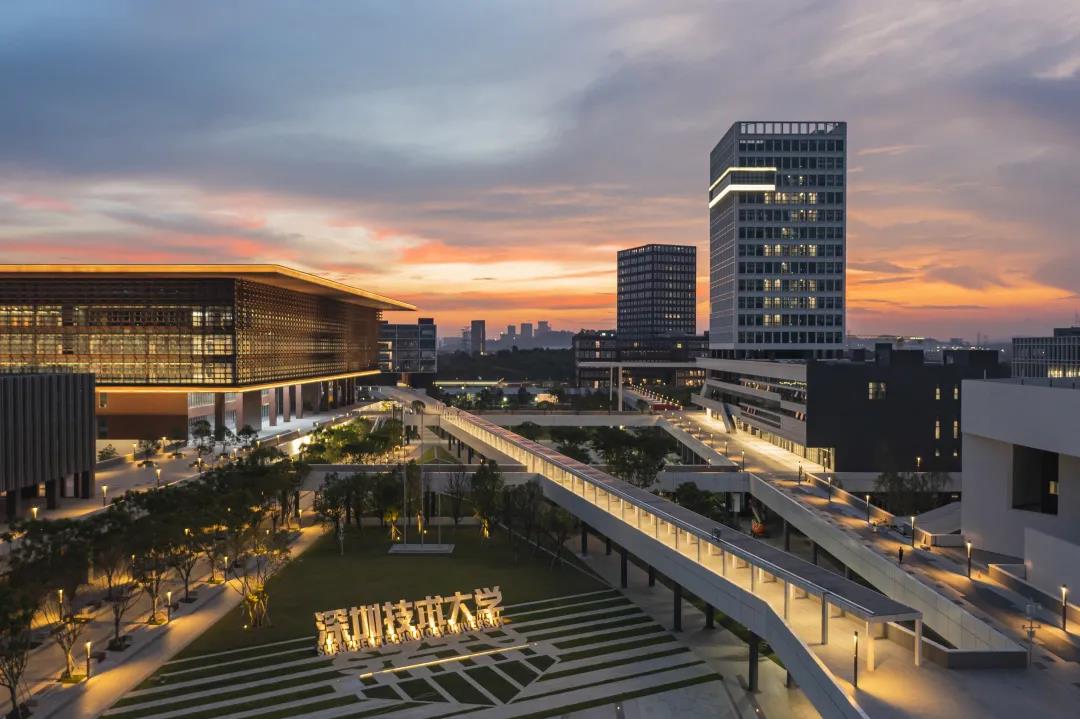From September 22 to September 26, Shenzhen Technology University (SZTU) held the 2025 International Week. Over 60 professors and corporate executives from Germany, Switzerland, Austria, Singapore, Finland, and other countries, along with over 60 international students engaged in a series of academic and cultural activities.
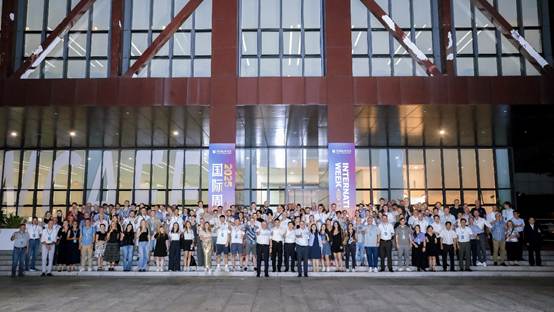
Group photo of the international guests and representatives of SZTU [Photo/Party Committee Publicity Department]
On the evening of September 22, SZTU held a warm welcome reception, attended by Prof. Chen Qiuming, secretary of the Party Committee of SZTU; Prof. Ming Zhong, member of the Party Committee and vice president of SZTU; along with deans of different colleges and heads of functional departments.
Prof. Chen Qiuming welcomed the guests and stated that the International Week serves not only as a vital platform for the university’s openness and internationalization but also as a shining emblem of its international talent cultivation. Through in-depth exchanges between all the faculty and students, he hoped that they would forge friendships and further cooperate with each other.
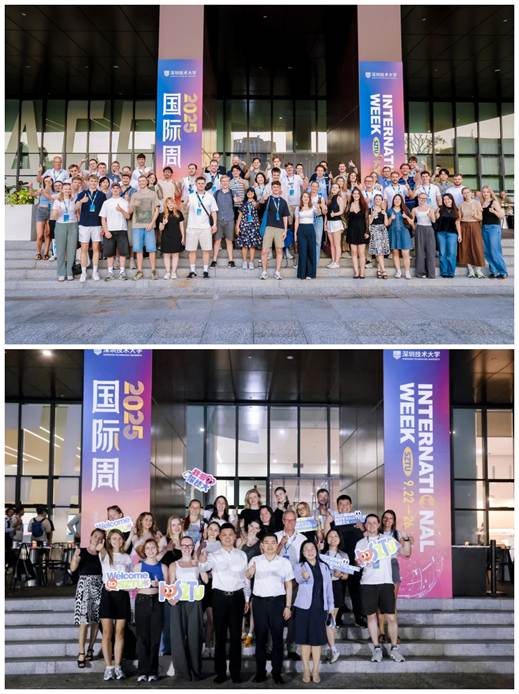
International students at the welcome reception [Photo/Party Committee Publicity Department]
SZTU International Week had successfully run for four times. During the 2025 International Week, 54 international professors and 17 professors from SZTU jointly delivered 121 international courses to the Chinese and international students. Among these, 70 professional courses were offered to the Class of 2025, focusing on the cutting-edge theme of “Artificial Intelligence and Its Applications” and spanning multiple disciplines including engineering, science, economics, and arts.
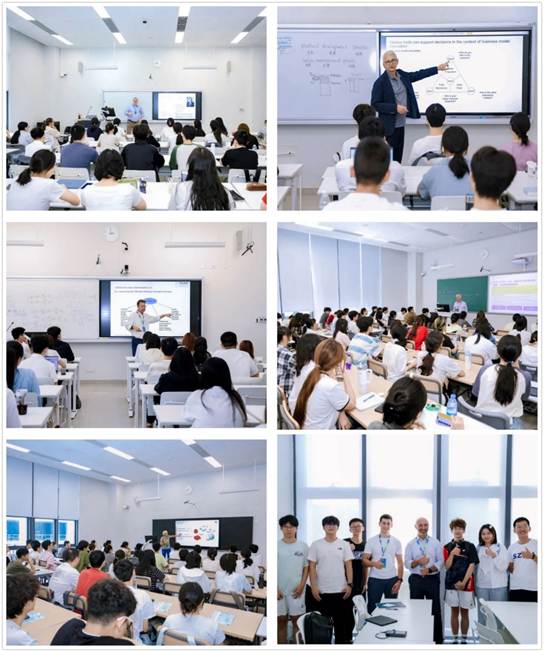
The international courses during the week [Photo/Party Committee Publicity Department]
Apart from offering international courses, the week also features an international forum, company visits, and a series of cultural exchange activities, including Bavarian Cultural Night, Traditional Chinese Medicine Culture Festival, Chinese Music Experience, Calligraphy Workshop, and Enamel Craft Workshop, in order to strengthen academic and cultural exchanges while broadening students’ global vision.
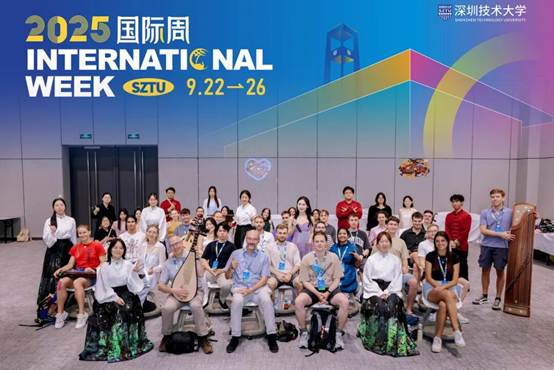
Participants of the traditional Chinese music lesson [Photo/Party Committee Publicity Department]
On September 25, the international guests explored the School of Music and School of Design and Innovation, immersing themselves in traditional Chinese culture through experience classes of Chinese folk music, calligraphy, and enamel craftsmanship.
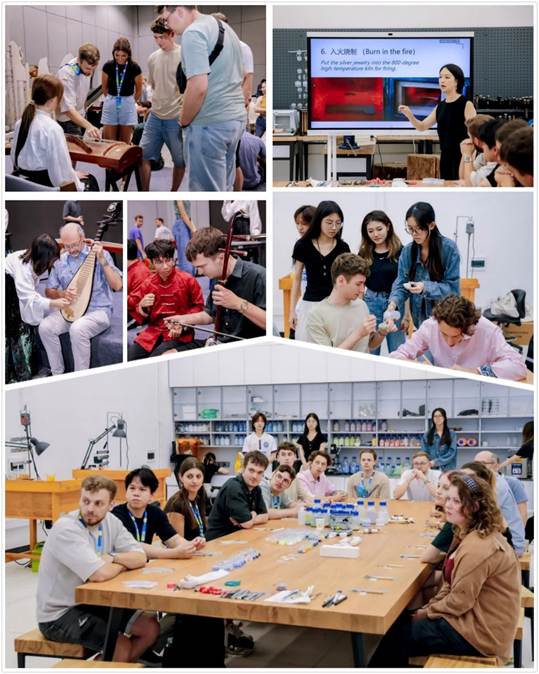
The international guests learn about traditional Chinese musical instruments, calligraphy, and enamel craft. [Photo/Party Committee Publicity Department]
The Bavarian Cultural Night, as a highlight of the International Week, also took place on that evening, attended by Prof. Chen Qiuming, Prof. Ming Zhong, and Prof. Deng Yuanlong, vice president of SZTU, together with deans of different colleges, heads of functional departments, student representatives and the international guests.
Since its founding, SZTU has maintained close partnerships with many universities of applied sciences in Bavaria, Germany. The Bavarian Cultural Night has been a typical activity of SZTU International Week, co-organized by the International Cooperation and Exchanges Department and the Catering Service Center. The participants had a rich buffet including authentic Bavarian cuisine, dessert, snacks and beverages, and enjoyed wonderful performances by the teachers and students.

Participants and performances at the Bavarian Cultural Night [Photo/Party Committee Publicity Department]
On September 26, the 7th High-Level International Forum on the theme “Artificial Intelligence-Reshaping the Future of Universities” was held at SZTU as another major event of the International Week. The forum brought together academic and industry experts from multiple countries such as Germany, Italy, Kazakhstan and Singapore to discuss paradigm innovation in higher education, new path of industry-education integration and lifelong learning in the age of AI through keynote speeches and panel discussion. The forum was also highlighted by a signing ceremony between SZTU and 14 enterprises, higher education institutions and associations.
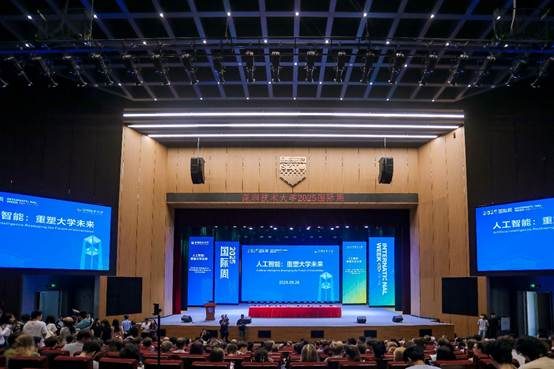
The International Forum takes place at SZTU Auditorium. [Photo/Party Committee Publicity Department]
At the ceremony, Prof. Liang Yongsheng, vice president of SZTU, signed memorandums of understanding (MOUs) with the representatives of six foreign-invested enterprises and an association, including SwissCham South China, IMEDCO Tech (Shenzhen) Co., Ltd., BOCK Precision Components (Guangdong) Ltd., EF Electrical (Shenzhen) Co., Ltd., REHM Thermal Systems (Dongguan) Limited, VALEO Schalter und Sensoren GmbH, and WIK Shenzhen Domestic Appliances Co., Ltd. The signing ceremony with enterprises was facilitated by the active promotion of Prof. Holger Haldenwang, dean of the Business School, and Prof. Franz Raps, dean of the College of Urban Transportation and Logistics. The partnerships cover a range of cutting-edge fields such as advanced manufacturing, green energy and medical technology, marking a new stage of Sino-German collaborative innovation in industry, academia and research.
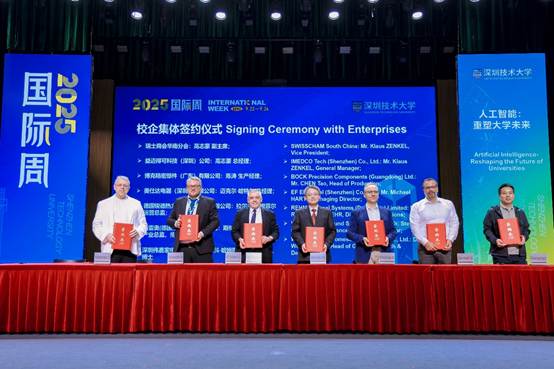
Signing ceremony with enterprises [Photo/Party Committee Publicity Department]
Prof. Liang also signed MOUs with the representatives of six art universities and one music association, including Conservatorio Arcangelo Corelli di Messina, Bangkok Thonburi University, Kazakh National Academy of Arts named after T. K. Zhurgenova, Shinawatra University in Thailand, Association of Musical Artists of Niš in Serbia, Conservatorio di Musica Giacomo Puccini La Spezia, and Conservatorio di Musica Luigi Cherubini Firenze.
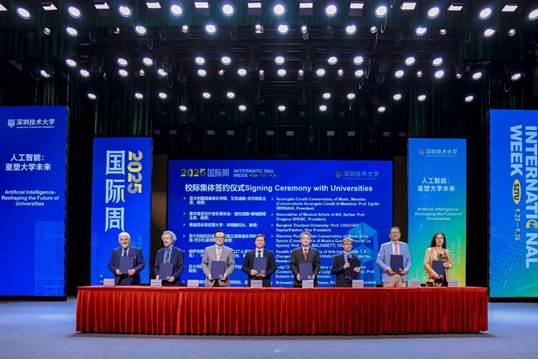
Signing ceremony with universities [Photo/Party Committee Publicity Department]
The signing ceremony was followed by four keynote speeches. In the speech, Prof. Chen Qiuming, secretary of the Party Committee of SZTU, outlined SZTU’s coping strategies in the AI era through eight focus areas, including its positioning, industry-education integration, subject setup, talent cultivation, scientific research, faculty structure, education evaluation, and governance mechanism.
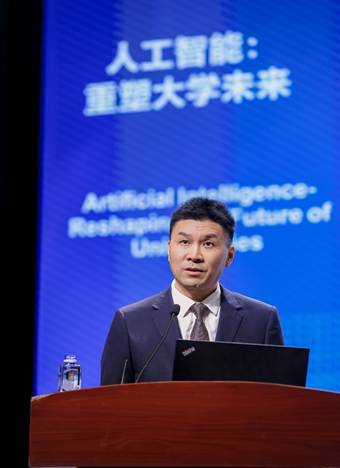
Prof. Chen Qiuming delivers a keynote speech. [Photo/Party Committee Publicity Department]
Prof. Sabine Jaritz, chairwoman of the Senate and vice-chairwoman of the University Council of OTH Regensburg, proposed a “3P” strategy, namely Potential, Policies and People, for the higher education development in the AI era. She expected that the future of universities of applied sciences should features a competency-first approach, human-AI collaboration, digitally enhanced practice, and lifelong learning hubs.
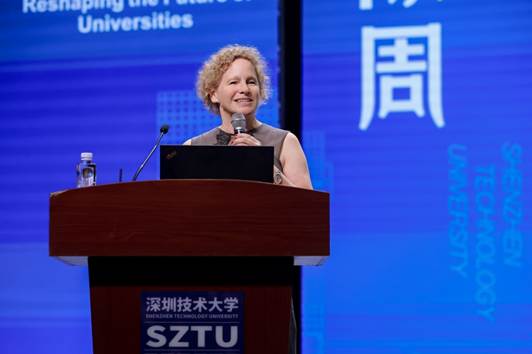
Prof. Sabine Jaritz gives a speech about AI on campus. [Photo/Party Committee Publicity Department]
Prof. Michael Schroeder from the Dresden University of Technology (TU Dresden), showed the paradigm shift of machine learning from “symbolic reasoning” to “deep learning”, and highlighted three critical drivers of AI development—data, computing power, and effective technology transfer from universities to industry.
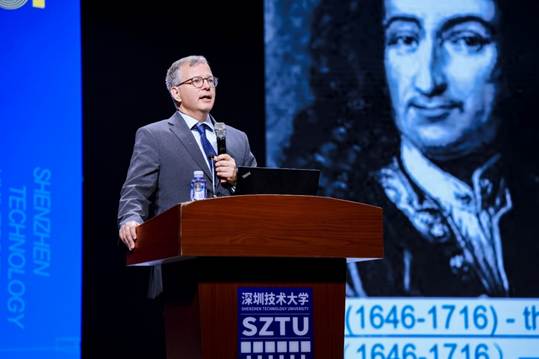
Prof. Michael Schroeder makes a speech on AI and TU Dresden. [Photo/Party Committee Publicity Department]
Assoc. Prof. Zhou Fei, president of Shinawatra University, shared Thailand’s national AI strategies, and urged universities to proactively lead the AI revolution in education, changing the roles of teachers into mentors, collaborators, facilitators and ethical guardians.
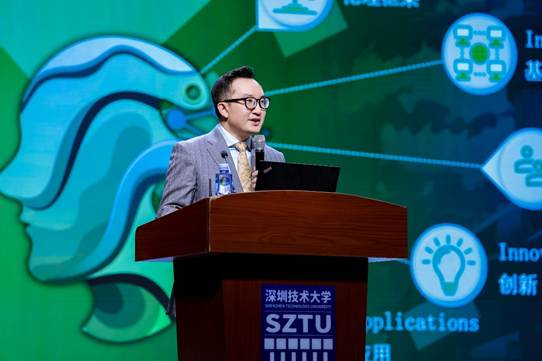
Assoc. Prof. Zhou Fei gives a keynote speech. [Photo/Party Committee Publicity Department]
At the panel discussion, four guest speakers shared their insights on AI’s impact. Assoc. Prof. Zeng Siyu, director of the International Cooperation and Exchanges Department of SZTU, moderated the discussion. The speakers included Prof. Chew Lock Yue, associate dean of the College of Science of Nanyang Technological University; Dr. Steffen Klarmann, advanced industrial director of Valeo Schalter und Sensoren GmbH; Prof. Kabyl Khalykov, vice rector for research of Kazakh National Academy of Arts; and Prof. Dragana Spasic, president of Association of Musical Artists of Niš, Serbia. Their discussions highlighted the use of AI for personalized student feedback, the need to align engineering education with real-world industry projects, the integration of AI into arts education, and the importance of maintaining human empathy and ethical judgment alongside AI adoption.
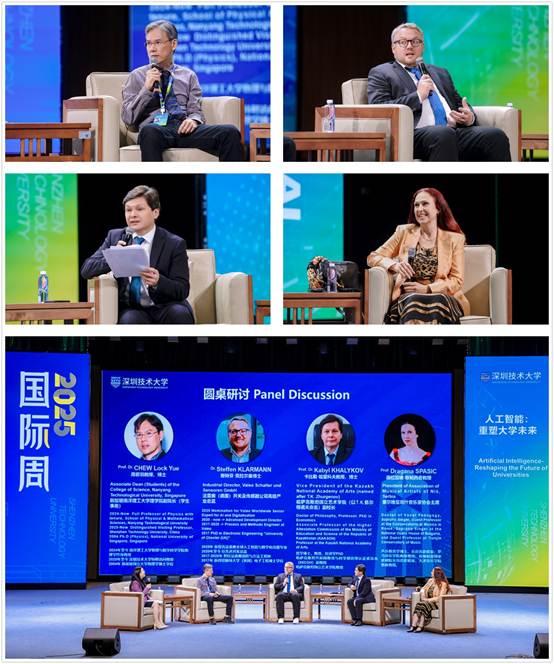
Panel discussion at the forum [Photo/Party Committee Publicity Department]
The International Forum finally concluded with a certificate awarding ceremony. Prof. Chen Qiuming and Prof. Ming Zhong presented certificates of participation to over 120 international participants.
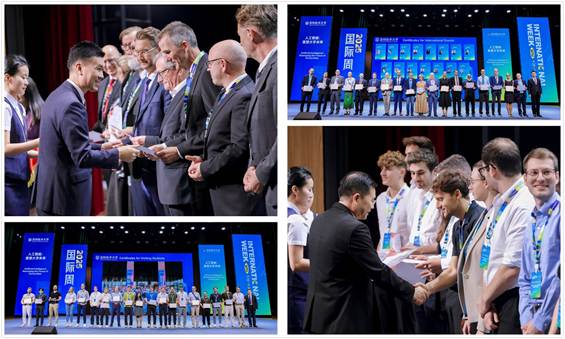
Certificate awarding ceremony [Photo/Party Committee Publicity Department]
The last day of 2025 International Week also featured the launch of the Second Traditional Chinese Medicine Culture Festival of SZTU, which attracted many international teachers and students to learn about traditional Chinese medicine (TCM). Prof. Ming Zhong, vice president of SZTU, attended the festival together with the heads of related colleges and departments.
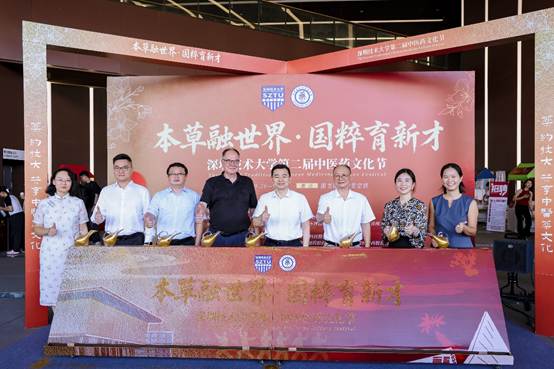
Opening ceremony of the Second Traditional Chinese Medicine Culture Festival [Photo/Party Committee Publicity Department]
The four-day festival featured six themed display zones, including TCM specimen exhibition, international immersive experience area, TCM innovation and industry exhibition, career fair and guidance area, TCM garden party, and TCM classroom, serving as a vibrant platform to enhance understanding and recognition of TCM among both domestic and international participants. Through hands-on interactive activities and cultural displays, the festival aimed to promote the modernization and international exchange of TCM, supporting the development of the Greater Bay Area’s biomedical industry.
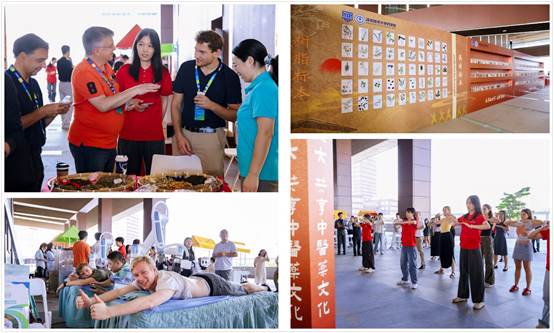
Exhibits and activities during the festival [Photo/Party Committee Publicity Department]
Although the 2025 SZTU International Week has come to a successful conclusion, the deep integration between AI and higher education is still in process. In the new era, SZTU will work together with global partners to continuously promote educational innovation and industry-education collaboration.
Drafted by Olivia(赖丽伟)/ International Cooperation and Exchanges Department
Revised by Brian(郑斌)/ International Cooperation and Exchanges Department
Edited by Brian(郑斌)/ International Cooperation and Exchanges Department
